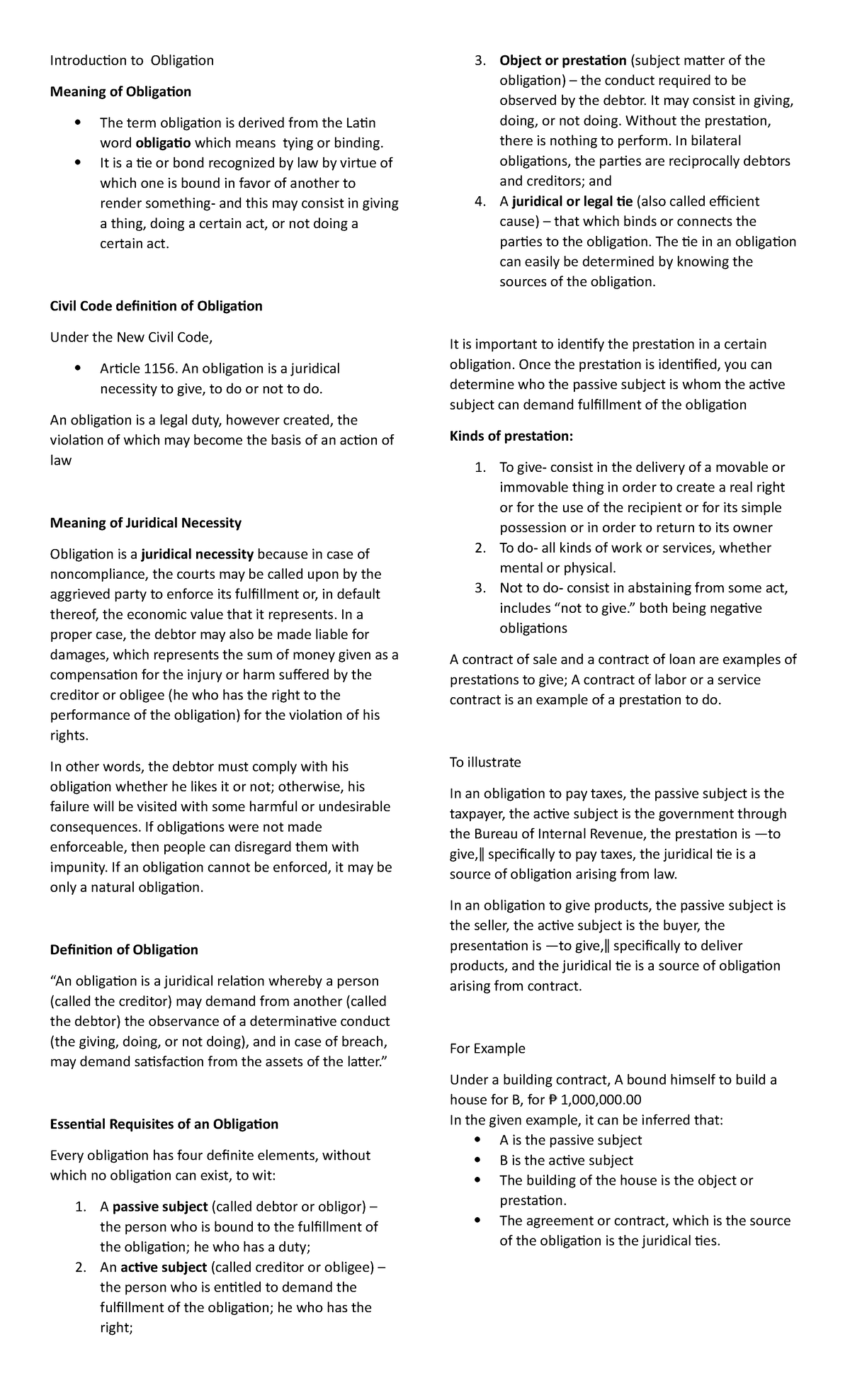Law On Obligations And Contracts Meaning - It is the body of rules. Conditional obligation means the duty to pay or perform certain acts. Contract law is the legal framework that controls parties’ agreements, specifying their rights, obligations, and remedies in various. Contract law is a body of law that governs, enforces, and interprets agreements related to an exchange of goods, services,. Some common uses of the term obligation in a legal sense include:
Contract law is the legal framework that controls parties’ agreements, specifying their rights, obligations, and remedies in various. Contract law is a body of law that governs, enforces, and interprets agreements related to an exchange of goods, services,. Conditional obligation means the duty to pay or perform certain acts. It is the body of rules. Some common uses of the term obligation in a legal sense include:
It is the body of rules. Contract law is a body of law that governs, enforces, and interprets agreements related to an exchange of goods, services,. Conditional obligation means the duty to pay or perform certain acts. Some common uses of the term obligation in a legal sense include: Contract law is the legal framework that controls parties’ agreements, specifying their rights, obligations, and remedies in various.
LAW Obligation AND Contract Business Management BSU Studocu
Contract law is a body of law that governs, enforces, and interprets agreements related to an exchange of goods, services,. Some common uses of the term obligation in a legal sense include: Conditional obligation means the duty to pay or perform certain acts. Contract law is the legal framework that controls parties’ agreements, specifying their rights, obligations, and remedies in.
Essentials in Law on Obligations and Contracts ( For ABM Students
Contract law is a body of law that governs, enforces, and interprets agreements related to an exchange of goods, services,. Conditional obligation means the duty to pay or perform certain acts. Some common uses of the term obligation in a legal sense include: Contract law is the legal framework that controls parties’ agreements, specifying their rights, obligations, and remedies in.
(PDF) Law on Obligation and Contracts
Conditional obligation means the duty to pay or perform certain acts. Contract law is a body of law that governs, enforces, and interprets agreements related to an exchange of goods, services,. Contract law is the legal framework that controls parties’ agreements, specifying their rights, obligations, and remedies in various. It is the body of rules. Some common uses of the.
OBLICON (Obligations on Law and Contracts) Readings and Notes 1
Contract law is the legal framework that controls parties’ agreements, specifying their rights, obligations, and remedies in various. Conditional obligation means the duty to pay or perform certain acts. Contract law is a body of law that governs, enforces, and interprets agreements related to an exchange of goods, services,. Some common uses of the term obligation in a legal sense.
Business Law Obligations and Contracts Module 1 Introduction to
Conditional obligation means the duty to pay or perform certain acts. Some common uses of the term obligation in a legal sense include: Contract law is a body of law that governs, enforces, and interprets agreements related to an exchange of goods, services,. Contract law is the legal framework that controls parties’ agreements, specifying their rights, obligations, and remedies in.
THE LAW ON OBLIGATIONS AND CONTRACTS (2021 EDITION) by DE LEON Lazada PH
Conditional obligation means the duty to pay or perform certain acts. It is the body of rules. Contract law is the legal framework that controls parties’ agreements, specifying their rights, obligations, and remedies in various. Some common uses of the term obligation in a legal sense include: Contract law is a body of law that governs, enforces, and interprets agreements.
3 Civil Law Obligations and Contracts Flashcard 3 Civil Law
It is the body of rules. Contract law is the legal framework that controls parties’ agreements, specifying their rights, obligations, and remedies in various. Conditional obligation means the duty to pay or perform certain acts. Some common uses of the term obligation in a legal sense include: Contract law is a body of law that governs, enforces, and interprets agreements.
Law of obligations Introduction and concept of obligation
It is the body of rules. Some common uses of the term obligation in a legal sense include: Contract law is the legal framework that controls parties’ agreements, specifying their rights, obligations, and remedies in various. Conditional obligation means the duty to pay or perform certain acts. Contract law is a body of law that governs, enforces, and interprets agreements.
THE LAW AND Obligation Contracts THE LAW AND OBLIGATION CONTRACTS
Contract law is the legal framework that controls parties’ agreements, specifying their rights, obligations, and remedies in various. Conditional obligation means the duty to pay or perform certain acts. It is the body of rules. Some common uses of the term obligation in a legal sense include: Contract law is a body of law that governs, enforces, and interprets agreements.
Obligations and Contracts PDF Law Of Obligations Misrepresentation
Contract law is a body of law that governs, enforces, and interprets agreements related to an exchange of goods, services,. Some common uses of the term obligation in a legal sense include: Conditional obligation means the duty to pay or perform certain acts. Contract law is the legal framework that controls parties’ agreements, specifying their rights, obligations, and remedies in.
Some Common Uses Of The Term Obligation In A Legal Sense Include:
Contract law is a body of law that governs, enforces, and interprets agreements related to an exchange of goods, services,. Contract law is the legal framework that controls parties’ agreements, specifying their rights, obligations, and remedies in various. Conditional obligation means the duty to pay or perform certain acts. It is the body of rules.









